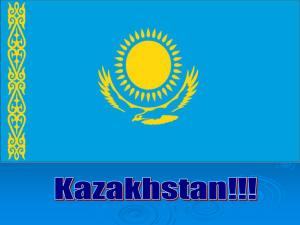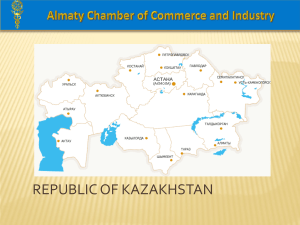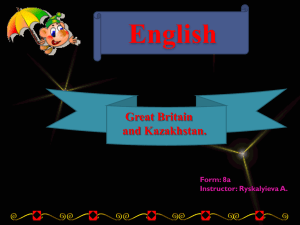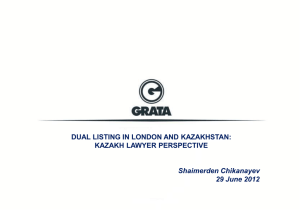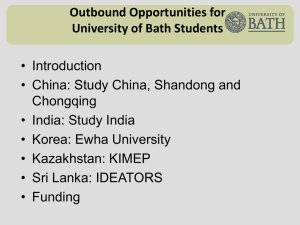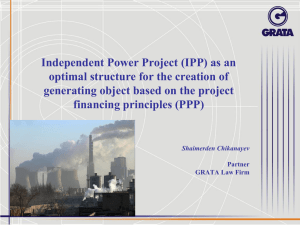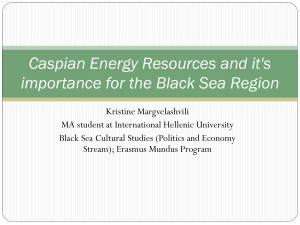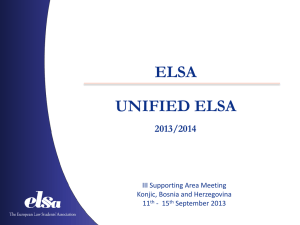Foreign Policy Paper - revised 17.06.014
advertisement
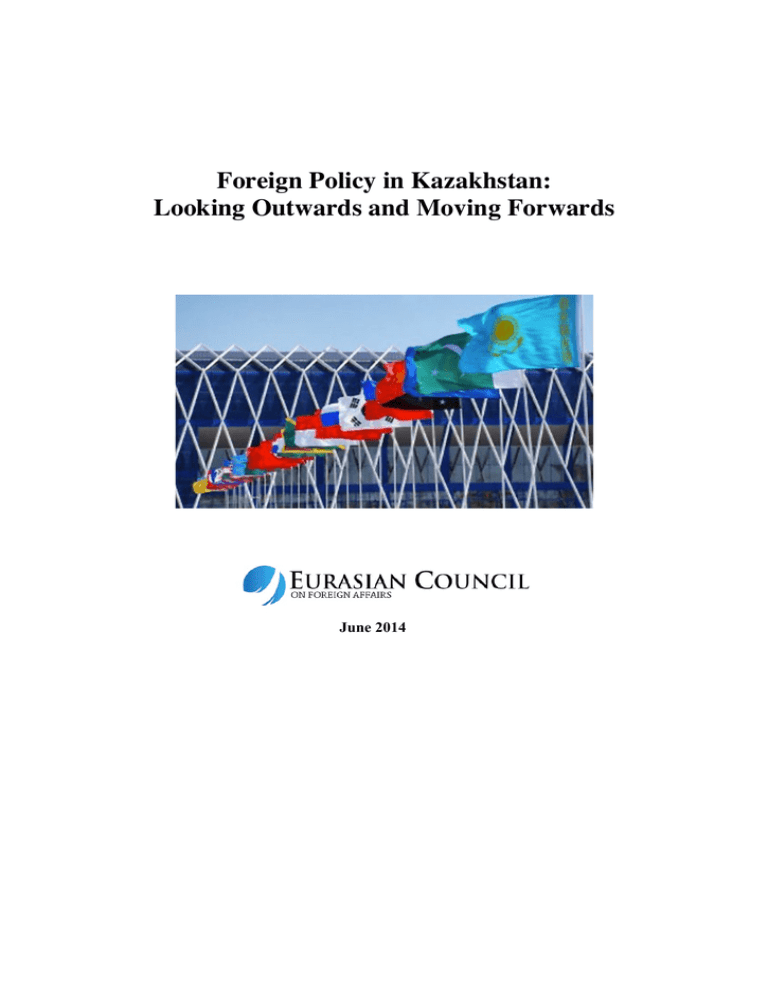
Foreign Policy in Kazakhstan: Looking Outwards and Moving Forwards June 2014 Table of Contents Introduction pg. 3 Kazakhstan’s Geopolitical Location pg. 3 Relations with China and Russia pg. 4 Relations with the West pg. 5 Participation in International Bodies pg. 7 Kazakhstan’s Foreign Policy Going Forwards pg. 9 About the ECFA pg. 10 Introduction In the 1990s and 2000s Kazakhstan emerged as a regional leader in Central Asia. Since then, its increasingly sophisticated foreign policy has secured it a prominent place in the broader international arena. A secular Muslim-majority democratic state strategically located at the cross-roads of Europe and Asia, Kazakhstan is uniquely positioned to help bridge the global divide between ‘East’ and ‘West’. Recognizing that as both an opportunity and a responsibility, it has worked hard to maintain its friendly relations with parties as diverse as the United States, the EU, China and Russia. How, then, has a country the size of Western Europe, but with a population of just 17 million, managed to pull itself from postSoviet obscurity and establish itself as a serious international player in such a short span of time? Kazakhstan’s Geopolitical Location Kazakhstan shares borders with Russia, China, Kyrgyzstan, Turkmenistan and Uzbekistan. Its territory extends over 2.7 million square kilometers (a million square miles), which makes it more than twice the size of the other four Central Asian states combined. It is also the largest landlocked country in the world. Its southern border with Uzbekistan cuts across the shrinking landlocked Aral Sea, a body of water over which several nations have conflicting interests. Russia and China, which neighbour Kazakhstan to the north and east respectively, have nuclear arsenals and are permanent members of the UN Security Council. Rich in oil, gas, coal, uranium, rare minerals and other natural resources as well as in agricultural produce, Kazakhstan’s abundance has made it vulnerable to territorial pressures. Since it became an independent state in 1991, Kazakhstan has been exposed to considerable risk in this regard. Its approach to managing this complex geopolitical situation has been to adopt a long-game multi-vectored foreign policy, a key theme of which is economic diplomacy. The framework and key objectives of this policy are laid out in the Kazakhstan Foreign Policy Concept.1 Central to Kazakhstan’s foreign policy is the maintenance of strong and stable relations with its immediate neighbours. Kazakhstan has signed all relevant regional accords and joined or initiated regional groupings, including the Commonwealth of Independent States, the Cooperation Council of Turkic Speaking States, and the Conference on Interaction and Confidence-Building Measures in Asia. It is also a founding member of the Customs Union with Russia and Belarus and will be a founding member of the Eurasian Economic Union (EEU) when it comes into effect on January 1st, 2015. The Presidents of Kazakhstan, Russia and Belarus met in Astana on May 29th, 2014, to sign the treaty establishing the EEU. Loosely modelled on the EU, the objective of the EEU is to facilitate closer economic cooperation between the three states. Each of the bodies mentioned here strengthens regional cooperation and has been instrumental in maintaining amicable relations across the region throughout the post-Soviet nation-building process. Broadly speaking, Kazakhstan has maintained positive relations with all its neighbours, largely through its focus on economic and political security. Kyrgyzstan is a particularly strong ally in the region and the two countries reaffirmed their links during the mutual exchange of frequent presidential and prime-ministerial visits. 1 http://www.kazakhembus.com/page/foreign-policy-concept Relations with China and Russia China and Russia, Kazakhstan’s giant neighbours, have required a more nuanced foreign policy. Because Kazakhstan is keen to attract large-scale foreign investment to fund technological development and diversification, trade and investment with China and Russia continue to be top priorities. Its focus on the growing Chinese market has been particularly prudent, since 20% of the country’s oil already goes to China.2 China needs vast quantities of energy and raw materials for its booming development, but growing tensions around the South China Sea and the US presence in the region have created uncertainty over US-Chinese trade relations. This has prompted China to seek alternative import routes and partners.3 The oilfields of Central Asia have been an obvious area of interest. In 2013, when the Kashagan oil pump opened, the China National Petroleum Corporation made sure that it had a share in the project (the Kashagan project has since been stalled due to technical problems). This followed the 2005 Chinese purchase of PetroKazakhstan and Chinese investment in MangistauMunaiGas in 2009. Erica S. Downs, energy analyst at the Brookings Institution in Washington, reports that China is now the largest foreign oil producer in Kazakhstan.4 Ernst & Young’s 2013 Kazakhstan Attractiveness Survey concurs. It notes that, ‘thanks to its mineral endowment, Kazakhstan has become China’s most important economic partner in Central Asia. Bilateral economic ties should expand even further, given each country’s strong growth rates and China’s growing demand for Kazakhstan’s rising exports of oil and gas.’5 But there is much more to Kazakh relations with China than just natural resources. As a founding member of the Shanghai Cooperation Organisation, Kazakhstan joined with China, Russia, Kyrgyzstan and Tajikistan in 1996 to facilitate political, military and economic cooperation (Uzbekistan joined the group in 2001). Kazakhstan and China share not just a 1,700km border but also interests in countering terrorism and drug trafficking and in maintaining regional stability. In addition, China is working with Kazakhstan to develop critical infrastructure such as Western Europe-Western China highway. Art and cultural exchanges regularly take place and trans-border migration is high, particularly of students and skilled workers. Despite occasional differences of opinion between the two countries over policy and Kazakhstan’s friendship with the United States, Kazakhstan has managed to maintain its position as a beneficial partner to China and the two parties speak publicly and warmly of one another.6 Kazakhstan has skilfully balanced its growing friendship with China against its long-time relationship with Russia. Russia has always been a close partner with Kazakhstan, a partnership some critics have suggested is too close. Such criticism, however, is shortsighted in that it overlooks the fact that the relationship is built on much more than just foreign policy. The two countries share deep and historic ties and 23.7% of Kazakhstan’s population define themselves as ethnically Russian.7 Russian is still a language of interethnic communication in Kazakhstan, and is given a status in the constitution of a 2 Ernst & Young Attractiveness Survey (2013) http://www.ey.com/GL/en/Newsroom/News-releases/News_Kazakhstanremains-stable-destination-for-investors 3 New York Times (2006) http://www.nytimes.com/2006/03/17/business/worldbusiness/17kazakh.html?_r=0 4 New York Times (2013) http://www.nytimes.com/2013/09/24/world/asia/china-gains-new-friends-in-its-quest-forenergy.html?_r=0 5 Ernst & Young Attractiveness Survey (2013) http://www.ey.com/GL/en/Newsroom/News-releases/News_Kazakhstanremains-stable-destination-for-investors 6 China News (2012) http://www.china.org.cn/opinion/2012-02/27/content_24743753.htm 7 http://www.indexmundi.com/kazakhstan/demographics_profile.html 4 language to be used in official settings on an equal basis with the state language, Kazakh. There is undoubtedly a strong Russian flavour to Kazakhstan, but it would be wrong to assume that the state is a Kremlin puppet. It is not. Nor can Kazakhstan can be constructively compared to the other post-Soviet states. Unlike some, Kazakhstan has carefully reformed its economy and political system guided by international advice. It has also invited international electoral-monitoring organisations in to review its election procedures and to assist in developing its democratic election process.8 This strategy has met with success. Since 1991 the average Kazakh has benefited from the country’s steady economic reforms and growth with increased prosperity of their own. By 2016, GDP per capita is expected to reach US$15,000, which would make it a “high income economy” in the eyes of the World Bank.9 Along with its membership in the Shanghai Cooperation Organisation and the Customs Union, Kazakhstan has also signed on to the Collective Security Treaty Organisation (CSTO), which brings together Russia, Kazakhstan, Armenia, Belarus, Kyrgyzstan and Tajikistan. This body works to create military and strategic stability across several postSoviet states. Russia, like China, has considerable energy interests in its neighbour and for some time has benefited from cheap oil imports from Kazakhstan. Nonetheless, there have been occasional conflicts of interest between the two countries. For example, Kazakhstan’s support for the allied invasion of Afghanistan – in particular its provision of land and air space for the use of US forces – and its exports to China have caused unease in Moscow. However, Kazakhstan has taken steps to balance such policies with ones that clearly support Russian interests, (while meeting its own interests) such as its membership in the Customs Union (which the United States is ambivalent about10). Such moves have strengthened its relationship and economic ties with Russia. Relations with the West An even trickier balancing act for the Kazakh government has been retaining close ties with its superpower neighbours while at the same time maintaining positive relations with the West. Britain has long had strong economic ties with Kazakhstan, but recently there has been a subtle shift in dynamic that signals a rebalancing of power. The British Prime Minister, David Cameron, visited the country in 2013, becoming the first serving British Prime Minister to do so. At that time, he spoke warmly of Anglo-Kazakh relations. His visit was followed early in 2014 by a visit from Baroness Warsi, the British Senior Minister of State for Foreign and Commonwealth Affairs. Britain has considerable oil and mineral interests in Kazakhstan and during these visits lucrative contracts were signed. The British Prime Minister and Kazakh President also included discussions on Afghanistan, Iran and the Middle East in their talks.11 Kazakhstan’s strategic repositioning as more than just an energy marketplace is in play here and governments like Britain now look to it as a key partner in the region, a position only reinforced by the Ukrainian crisis and Kazakhstan’s exquisitely balanced response. 8 OSCE, http://www.osce.org/astana/82315 Ernst & Young Attractiveness Survey (2013) http://www.ey.com/GL/en/Newsroom/News-releases/News_Kazakhstanremains-stable-destination-for-investors 10 Financial Times (2012) http://www.ft.com/cms/s/0/a5b15b14-3fcf-11e2-9f71-00144feabdc0.html#axzz30GarPKK8 11 UK Government Press Office (2013) https://www.gov.uk/government/speeches/kazakhstan-visit-prime-ministers-pressconference-with-nursultan-nazarbayev 9 5 The United States has considerable investment in Kazakhstan, and in 2013 the US government assessed the country as having the best investment climate in the region.12 USKazakh relations have been continually reinforced by a shared goal of nuclear nonproliferation13 as well as by a mutual commitment to counter-terrorism and regional peacekeeping. In 2012, President Obama spoke of the strength of the two countries’ bilateral relations at the Seoul Nuclear Security Summit, going on to remark on Kazakhstan’s important role in Afghanistan.14 His words and the venue at which they were spoken highlight the cornerstones of US-Kazakh relations. Such words were echoed yet again in the Hague in March 2014 during the 3rd Nuclear Security Summit and during President Obama’s meeting with President Nazarbayev which took place on the margins of the summit. However, the war in Afghanistan altered the focus of those relations by shifting US priorities from natural resources to counter-terrorism and access to regional land bases. Since the start of US military operations in Afghanistan in 2001, Kazakhstan has demonstrated an ongoing commitment to the allies’ removal of the Taliban and efforts to establish democracy there. Through its support for US intervention, Kazakhstan made itself vulnerable to security threats by extremists. For that reason, it has chosen to provide the United States with aid and logistical assistance but not to participate militarily in the region. In a speech given in Astana on May 8th, 2014, US Deputy Secretary of State William J. Burns reaffirmed the United States’ commitment to and interests in Kazakhstan and Central Asia, adding that the “crisis in Ukraine and the ongoing transition in Afghanistan underscore what’s at stake and reinforce the importance of building a stronger and deeper relationship between our governments and between our peoples.”15 Kazakhstan established diplomatic relations with most European countries in the first few years after independence in 1991. Since then, it has forged increasingly close ties with France, Italy, Spain and Germany. President Nazarbayev has now made ten visits to France, and Presidents Francois Mitterrand and Nicolas Sarkozy each reciprocated with visits to Kazakhstan during their terms in office. During these visits, strategic partnership agreements were signed and economic relations expanded. President François Hollande is schedule to make a similar visit to Kazakhstan at the end of 2014. On June 10th of this year, Kazakh Foreign Minister ErlanIdrissov met with his French counterpart Laurent Fabius in Paris in conjunction with the Bureau International des Expositions’ official approval of Kazakhstan’s EXPO 2017 campaign. The two ministers had constructive talks regarding future collaboration in the areas of manufacturing, tourism, investment and nuclear energy. Two days later, President Nazarbayev met with Italian Prime Minister Matteo Renzi in Kazakhstan, with whom they oversaw the signing of cooperation agreements pertaining to agriculture, energy, and transportation. In referring to Kazakhstan’s strategic partnership with Italy, Nazarbayev noted that it “accounts for 13 per cent of Kazakhstan’s foreign trade. The total volume of Italian investments in our economy is $6.5 billion. Moreover, Italy is the largest consumer of Kazakhstan’s oil.” 12 Government (2013) http://www.state.gov/e/eb/rls/othr/ics/2013/204668.htm US Government http://www.state.gov/r/pa/ei/bgn/5487.htm 14 US Government Press Office (2012) http://www.whitehouse.gov/the-press-office/2012/03/26/remarks-president-obamaand-president-nursultan-nazarbayev-republic-kaza 15 http://www.state.gov/s/d/2014/225774.htm 13 6 Similar high-level meetings occur regularly between Kazakhstan and Spain. In May 2013, Erlan Idrissov visited Spain, where he held talks with political leaders and heads of major Spanish companies on expanding trade and economic cooperation between the two countries.16 In September, President Nazarbayev hosted Spanish Prime Minister Mariano Rajoy in Astana, where they discussed strategic partnerships in such areas as investment, transport, renewable energy and industry. President Nazarbayev told the Prime Minister, “We enjoy support of the Kingdom of Spain. Your country has supported our bid to host [the] grandiose EXPO 2017 event in Astana. In addition, the decision on Kazakhstan’s chairmanship in the OSCE was made in Madrid which is quite symbolic. Currently, there is the agreement on strategic partnership between our countries. The largest Spanish companies work in Kazakhstan, more than 70 joint ventures function in the country.”17 High-level talks and visits also occur between Kazakhstan and Germany, which was one of the first countries in Europe to support Kazakhstan’s bid to hold EXPO 2017 with the “Energy of the Future” theme.18 Cooperation between the two countries is rapidly expanding, particularly in the areas of trade and economic relations. Overall, Kazakhstan has maintained relations with the EU since 1993.19 The EU is now its largest trade partner, with over 40% of Kazakhstan’s exports going to member states. Between 1993–2013, the gross inflow of direct investments from EU member states to Kazakhstan’s economy exceeded $80bn.20 Because it offers alternatives to Russian oil and gas, Kazakhstan’s importance as an oil and gas supplier to the EU continues to grow. Taken together, Kazakhstan’s oil and gas exports to the EU account for more than 80% of its total exports. In addition, Kazakhstan is a major supplier of rare minerals and uranium ore to the EU. Kazakh imports from the EU are dominated by machinery and transport equipment, but also include many products from the manufacturing and chemicals sectors. Along with trade benefits, EU-run human rights projects21 and EU member state partnerships have been established to improve conditions for Kazakh citizens. EU-funded projects are also working with local and regional administration to stimulate small and medium business start-ups and public-private partnerships (PPP) investment.22 Reuters financial columnist and industry analyst Martin Hutchinson has predicted that European foreign investment in Kazakhstan is likely to continue due to the abundance of materials like copper and rare earths in the country, which enjoy a buoyant market in Europe.23 Participation in International Bodies Successfully maintaining these complex bonds has helped elevate Kazakhstan’s profile and international bodies like the UN have started to take notice. Chairing the Organization for Security and Cooperation in Europe (OSCE) in 2010 further bolstered the country’s international reputation, as did its involvement with allied operations in Afghanistan. In 2012 Kazakhstan became the first Central Asian state to be elected to the UN Human Rights Council (UNHRC). In 2013 it helped facilitate the P5+1 talks between Iran and Western governments, a role that included hosting two meetings in Almaty. 16 http://kazworld.info/?p=29647 http://www.inform.kz/eng/article/2593383 18 http://kazworld.info/?p=32082 19 http://www.kazembassy.cz/en/country-profile/foreign-policy.html 20 http://www.kazembassy.cz/en/country-profile/foreign-policy.html 21 http://eeas.europa.eu/delegations/kazakhstan/index_en.htm 22 http://eeas.europa.eu/delegations/kazakhstan/press_corner/all_news/news/2014/14.02.2014_en.htm 23 http://www.edgekz.com/kazakhstan-and-europe-building-ties.html 17 7 Since independence in 1991, Kazakhstan has also worked closely with NATO.24 In 2014, Kazakhstan’s First Deputy Minister of Defence, Saken Zhasuzakov, reaffirmed his country’s commitment to NATO at a meeting of the NATO Military Committee. He noted that NATO is an important part of Kazakhstan’s ‘multi-vector policy and contributes to the national and regional security.’25 Kazakhstan’s support proved strategically advantageous for the Northern Distribution Network throughout NATO operations in Afghanistan. The ongoing effort to ready Kazakhstan to participate fully in UN peacekeeping missions offers additional evidence of Kazakhstan’s commitment to assuming greater responsibility in world affairs.26 President Nursultan Nazarbayev has made it clear that his country seeks a more prominent role on the world stage. Kazakhstan is making a bid for a 2017-2018 non-permanent seat on the UN Security Council. It is basing its bid on four central pillars: food security, water security, energy security, and nuclear security. The only other contender for the seat is Thailand. Kazakhstan has shown itself well-positioned to make an important contribution in this role. Because its foreign policy has been carefully crafted to make strategic and longterm allies of parties who are sometimes loath to work directly with one another, it has become a vital go-between in prickly negotiations. The P5 +1 talks (also known as E3+3 talks) with Iran in 2013 are a case in point. Hosted in Almaty, these talks were facilitated by the neutral but well-connected Kazakh government, whose country benefits from being secular yet predominantly Muslim, key ideologies embraced by the opposing sides. Kazakhstan was thus able to ensure that both sides felt a degree of affinity and trust with their host. Moreover, as David Cameron noted, as a nation that has already successfully completed its own disarmament process, Kazakhstan has the “moral authority” to negotiate nuclear disarmament with Iran.27 Prior to this time, Kazakhstan gained enhanced credibility with Muslims in the Middle East states by supporting Palestine’s UN seat bid and by chairing the Organization of Islamic Conference [OIC] in 2011-12. In spring 2014, Kazakhstan’s foreign policy came into the spotlight due to unfolding events in Ukraine. On March 3rd, the Kazakhstan Ministry of Foreign Affairs issued a statement expressing its grave concerns, urging restraint on all sides, and calling for a negotiated resolution in accordance with international law.28 Around that time, some commentators began to speculate that Putin’s aim of reunifying the Russian-speaking population put Kazakhstan at risk. Martha Brill Olcott, Senior Associate at the Russia and Eurasia Program at the Carnegie Endowment for International Peace and Co-director of the al-Farabi Carnegie Program on Central Asia, was one of them. She concluded that Kazakhstan’s increasingly patriotic people would not tolerate any attempt by Russia to reunite Kazakhstan into an expanded Russia.29 Writing in Eurasianet.org, Joanna Lillis, who specialises in Central Asia, suggested that many Western leaders may be looking to Kazakhstan to exert a calming influence on Russia.30 The March 3rd Ministry of Foreign Affairs statement, as well as subsequent statements in April and May, can be seen as steps in that direction. 24 http://www.nato.int/cps/en/natolive/topics_49598.htm http://www.mod.gov.kz/mod-en/index.php/faq/948-chief-of-the-general-staff-of-the-armed-forces-of-kazakhstanparticipates-in-nato-military-committee-meeting 26 Reuters (2013) http://www.reuters.com/article/2013/12/20/us-kazakhstan-un-idUSBRE9BJ0BC20131220 27 UK Government Press Office (2013) https://www.gov.uk/government/speeches/kazakhstan-visit-prime-ministers-pressconference-with-nursultan-nazarbayev 28 Kazakhstan Government statement on Ukraine (2014) http://mfa.gov.kz/en/#!/news/article/13513 29 Martha Brill Olcott (2014) http://carnegieendowment.org/2014/03/05/after-crimea-will-kazakhstan-be-next-in-putin-sreintegration-project/h2ia 30 Joanna Lillis (2014) http://www.eurasianet.org/node/68218 25 8 President Nazarbayev’s standing does not appear to have been affected by these developments. At the Nuclear Security Summit in the Hague in March 2014, Nazarbayev held bilateral talks with a broad range of international leaders including US President Barack Obama, UK Prime Minister David Cameron, China’s President Xi Jinping, Pakistan’s Prime Minister Nawaz Sharif, Japanese Prime Minister Shinzo Abe and French President François Hollande.31 Clearly, Nazarbayev receives as warm a welcome in Brussels and Washington as he does in Moscow and Beijing. International leaders recognize that the West needs allies like Kazakhstan, who can provide a bridge to historically more challenging parties such as Iran and Russia. Equally, China and Russia recognize that they benefit from strong economic and trade relations with their neighbour. Kazakhstan’s Foreign Policy Going Forwards Regional analyst George Voloshin appraises Kazakhstan’s reaffirmed foreign policy as such: “Central Asia’s biggest country still remains committed to its traditional multi-vector strategy. This strategy, which is now closely associated with Kazakhstan on the international stage, implies the pursuit of well-balanced and mutually advantageous relations simultaneously on several different fronts. Russia, China, the U.S. and the EU are and will continue to be Kazakhstan’s primary partners in fields as diverse as trade, military cooperation or cultural exchanges.”32 Cynics suggested at the time that Kazakhstan’s willingness to relinquish its nuclear arsenal in the early 1990s stemmed from its inability to maintain control over the huge arsenal and its interest in securing foreign aid and favour with the West. With hindsight that assessment seems implausible. Kazakhstan was the first of the ‘stans’ to pay off its IMF debts (ahead of schedule, in 2000) and is now a middle-income country with considerable natural resources. But even if its decision was influenced by the factors suggested by the cynics, it took courage and vision to hand over its greatest military weapon when its two biggest neighbours – which make Kazakhstan itself, the world’s ninth largest nation, look small – are in possession of some of the world’s most powerful armaments. At independence and in the aftermath of the Soviet breakup, Kazakhstan found itself in the middle of a cluster of new Central Asian states and an increasingly outward-looking China. Since then, it has successfully brokered a network of relations that balance the opposing interests of its neighbours and yet favour Kazakhstan’s development. Kazakhstan continues to be forward-looking in it economic policies. In early 2014, it announced plans to develop a stimulus package for investors that would include a new law aimed at enhancing conditions for investment in the country. “The basis of our economy,” President Nazarbayev said, “is active work aimed at attraction of investments, both foreign and domestic. We are eager to create as favourable investment climate as possible.” 31 http://kazworld.info/?p=35691 The Central Asia Caucasus Analyst Field Report (2014) http://www.cacianalyst.org/publications/field-reports/item/12904kazakhstan-adopts-new-foreign-policy-concept.html 32 9 ABOUT THE ECFA Central Asia is a region larger than Western Europe and contains five countries: Kazakhstan, Kyrgyzstan, Tajikistan, Turkmenistan and Uzbekistan. Blessed with some of the richest and most diverse resources anywhere in the world, over the last twenty years the region has shown its commitment to become a reliable, long-term partner of the West. Kazakhstan is Central Asia’s engine for economic growth, and the Government of Kazakhstan has taken the lead in developing relations with the European Union. In its commitment to the process of deepening political and economic relations with the European Union, Kazakhstan is participating in the establishment of the Eurasian Council on Foreign Affairs (ECFA), which is a new and dynamic think tank working at the heart of the European Union. The first Honorary President of the Eurasian Council on Foreign Affairs is H.E. Erlan Idrissov, Foreign Minister of the Republic of Kazakhstan. The Eurasian Council on Foreign Affairs has been modelled on the Council on Foreign Relations in the United States, the United Kingdom’s Royal Institute of International Affairs at Chatham House and the EU’s own European Council on Foreign Relations. It is envisaged that over time, the Eurasian Council on Foreign Affairs will become a valuable and independent source of high-quality research, publications and information that will keep Europe fully abreast of the fast-changing development of the Central Asian region. This is a work-in-progress, and it will require dedication and commitment from the ECFA’s team of researchers and writers. The grant for the establishment costs and first-year programme of the ECFA has been provided by the Ministry of Foreign Affairs of the Republic of Kazakhstan. The ECFA and its staff are grateful for this generous donation and thank the MFA. It is envisaged that, as with similar institutions in other countries, governments in the region as well as corporate sponsors and private individuals will over the longer-term join the funding base of the ECFA. A list of upcoming publications can be found here. The formal launch of the ECFA is currently planned for November 2014, by which time we anticipate the establishment of a distinguished Advisory Council. The Director, Rauan Kenzhekhanuly, will provide regular news updates on the region in his Blog, and you can subscribe here to receive all news updates as well as the ECFA’s regular newsletters and bulletins. Important Disclaimer: Please note that the views expressed in our Occasional Papers series do not represent the views of its Honorary President H.E. Erlan Idrissov, Minister of Foreign Affairs of the Republic of Kazakhstan, or the views of any of the members of the Advisory Council of the ECFA. The purpose of the Papers is to create debate and discussion on the important developments occurring in Central Asia. They are designed to encourage further open discussion and debate, in which the views of all parties are to be encouraged. 10

